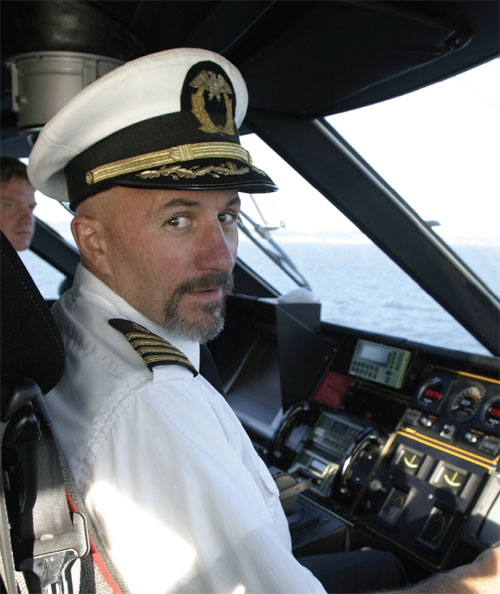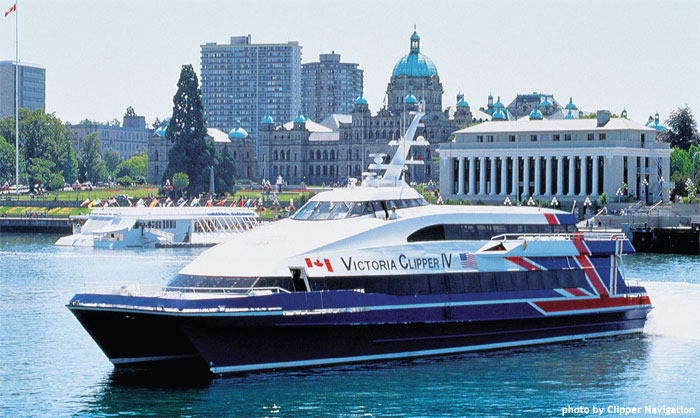On the job
Real world people working on the water
Authored by: Margaret Boyes
Brought to you by www.dieselduck.net, comments to [email protected]
Jim Scancella, Master, Clipper Navigation
 Jim Scancella has been master on the Victoria Clipper for 20
years. As a teenager he shipped on the Great Lakes, and has worked
in the marine industry ever since, over 30 years. Working for
Clipper Navigation means he can get home to his family at night.
Jim Scancella has been master on the Victoria Clipper for 20
years. As a teenager he shipped on the Great Lakes, and has worked
in the marine industry ever since, over 30 years. Working for
Clipper Navigation means he can get home to his family at night.
On The Job: Tell us about your current position. How long have you been doing it? What does it involve and what are the challenges?
Jim Scancella: I sail as master on the high speed catamaran for Clipper Navigation. Our main routing is from Seattle to Victoria. We have other vessels that operate almost exclusively in the summer months that take passengers whale watching from Seattle to Friday Harbour, the San Juan Islands and the Gulf Islands.
I’ve been in the marine industry for over 30 years, I started as a “wiper” in the engine room on a triple expansion steam ship that was built in 1911. I was 19 when I first stepped on a ship, I’m now 55. Our biggest challenge and the most important part of our job is to ensure the safety of the passengers. That’s our primary job. Then after that, we try to make sure passengers have a pleasant and memorable trip. I firmly believe as a company we have accomplished that goal for the last 20 years. We have a very good safety record.
OTJ: Why did you choose this job? What route have you taken in terms of education and experience?
Scancella: Working for Clipper Navigation gave me an opportunity to sail near home, rather than on deep sea vessels. Initially in my career I shipped on the Great Lakes as a teenager, right out of the Union Hall. I went to salt water vessels after about three years on the lakes. I’ve sailed on union vessels, research vessels for the government and for Universities, worked for oil companies on tankers, worked on general cargo vessels, bulk carriers, I worked tugboats in Alaska and local construction tugboats in Puget Sound and I worked as a tanker-man on barges as well. When I started raising a family I tried to find something that would keep me in this industry and get me home at night. I had a friend at Clipper Navigation who opened the door for me and I’ve been here ever since.
OTJ: What does it take to succeed in your job?
Scancella: I think the main thing with any job is to try to do the best you can everyday. This type of job requires a lot of training. There are numerous U.S. Coast Guard exams to pass and certifications to acquire. I guess it takes a bit of luck as well, because there are many qualified people in the industry who haven’t been able to stay in a particular job as long as I have.
OTJ: If there was anything you could change about your job what would it be?
Scancella: Not much. I don’t think there’s a whole lot I would change. I don’t think many people have a better “office window view” than I have. I travel up and down Puget Sound and all over the San Juan and Gulf Islands. I like what I do. I like running the boats. I like working with my crew. I like interacting with the passengers. Most of the time the passengers have a great trip and if they’re appreciative of it, that’s a good day for us. But as far as the specifics of operating the boat and the continued exceptional varying view, I don’t think it gets a whole lot better than that.
OTJ: What are your aspirations for growth in your job?
Scancella: As master I’ve reached the highest position I can on board this type of vessel. Of course there are the tonnage limitations on these smaller vessels. I have an unlimited tonnage license. Not unlimited masters’, but an unlimited “Second Mate’s Oceans”; I have a “1600 ton Masters Oceans License”, so as far as the marine industry goes there’s room for a bigger license. But based on my current family situation I don’t want to go deep sea. I’ll stick with the choice I made a while ago, to stay around the house and enjoy my wife and family after work everyday, which is basically rare in this industry except for ferries and local tugboats. Not many guys are in the position in this industry where you can do that.
OTJ: What was your most memorable moment on this job?
Scancella: I’ve been here for 20 years [laughs]; I can’t pick just one out. We have many sea stories we can tell, but more typical is a day like yesterday; we saw killer whales. Northbound we slowed the boat down then stopped for the passengers so they could get a better view. We saw about 30 orcas. We see orcas all summer.
But through the years we’ve rescued people from burning boats, gone on search and rescues missions as requested by the Coast Guard, and pulled people out of Puget Sound who had fallen overboard. When you travel for 20 years up and down Puget Sound you see a lot. Our vessels are fast and the Coast Guard knows we have a very large working platform with a large, well-trained crew. They don’t hesitate to ask us to respond to any situation if they believe we can help. We get called regularly. They know where we are because we’re always participating in the vessel traffic system, both Victoria traffic and Seattle traffic. They don’t hesitate to call and we’ve responded over the years many, many times.
OTJ: If you weren’t doing this what would you be doing?
Scancella: Career wise, I guess I like to work with my hands. I’m sort of an amateur carpenter. I like building things. That’s what I do in my spare time. I’m not sure I’d choose it for a career though. It’s much more fun if you do it for yourself. Maybe I’d be a teacher. I had considered going into education as a career many years ago.
OTJ: What are your thoughts about the future of your job?
Scancella: I believe that the future of fast ferry service should only increase. It may take a number of years, but I truly believe that an increase in vessels and routes is only a matter of time. Years ago in Seattle we had the “Mosquito Fleet.” They were small ferries operating all over Puget Sound. If you look back at the early history of Seattle, small passenger ferries were independently operated from downtown Seattle to Bainbridge Island and many other destinations. It was a very popular means of transportation in our history. Now, with automobile traffic virtually out of control as well as an exploding population, I see moving “back” to that mindset as a natural evolution, if you could call it that.
OTJ: Tell us about some people in your line of work that you admire.
Scancella: In the early days when I started sailing on the Great Lakes freighters , the guys that I worked with saw that I was a hard worker and were willing to teach me a number of the things I still draw from today. For instance when someone teaches you how to tie a specific knot, you never forget who that person was. I often think back to that time on my first ship when I didn’t know port from starboard — some of the lessons learned during that time were easier to learn than others, but for the most part I have tried to emulate many of the more positive qualities and styles from some of the “crusty” and “not so crusty” sailors that I have worked with my entire career.
OTJ: Do you have any advice for people who’d like to do your job?
Scancella: I’ve seen many kids come and go from here over the years, most of whom were hard workers and very intelligent, but I like to see people who have worked on many different vessels. I am a firm believer in the old saying “different ship, different long-splice.” When crew members are able to acquire a wide range of experience I see that as a tremendous benefit to them and their career. When I train a mate, I don’t want him to do everything just the way I do it. I want him to take a look at what I do, and at what all the other captains do as well, then formulate his own way to do things.
My advice would be to simply work hard and get a wide variety of experience.
|
|
The Victoria Clipper IV in Victoria harbour. Built in Bergen, Norway, the Clipper IV is 132 feet long and 28.5 feet wide, and has a passenger capacity of 330 passengers and 5 to 10 crew. Waterjet propulsion gives speeds up to 30 knots. |
